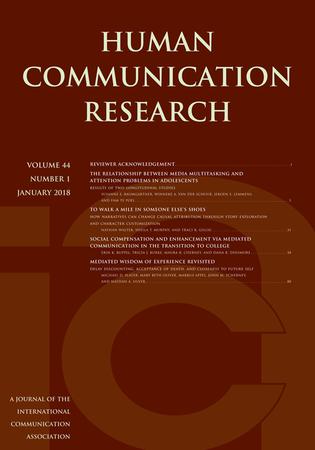单独商议:商议的偏见和放弃政治谈话
IF 4.4
1区 文学
Q1 COMMUNICATION
引用次数: 0
摘要
在我们调查人们如何思考和谈论移民的研究中,我们始终发现人们希望就政治进行合理的对话,但他们往往认为,由于其他人不了解情况、不理性、思想封闭和不文明,因此不可能进行富有成效的对话。我们认为,自私自利的偏见和现象学经验导致了一种偏见的看法,即自我比他人更有能力坚持理性思考的理想,我们将这一过程称为审议偏见。在研究1中,我们使用深度访谈的数据来发展审慎偏见的概念。在研究2中,我们使用一项调查来证明,认为其他人不了解情况、不理性、思想封闭和不文明的看法与与松散关系或持相反观点的人谈论政治的可能性降低有关。这些结果表明,审慎偏见可能是富有成效的政治对话的重大障碍。本文章由计算机程序翻译,如有差异,请以英文原文为准。
Deliberating alone: deliberative bias and giving up on political talk
In our research examining how people think and talk about immigration, we consistently find that people want to have a reasonable conversation about politics, but they often decide that productive conversations are not possible because other people are uninformed, irrational, close-minded, and uncivil. We argue that self-serving biases and phenomenological experiences lead to the biased perception that the self is far more capable of adhering to the ideals of rational deliberation than others, a process that we refer to as deliberative bias. In Study 1, we use data from in-depth interviews to develop the concept of deliberative bias. In Study 2, we use a survey to demonstrate that perceptions that other people are uninformed, irrational, close-minded, and uncivil are related to a decreased likelihood of talking politics with loose ties or those with opposing perspectives. These results suggest that deliberative bias may be a significant impediment to productive political conversations.
求助全文
通过发布文献求助,成功后即可免费获取论文全文。
去求助
来源期刊

Human Communication Research
COMMUNICATION-
CiteScore
8.20
自引率
2.00%
发文量
28
期刊介绍:
Human Communication Research is one of the official journals of the prestigious International Communication Association and concentrates on presenting the best empirical work in the area of human communication. It is a top-ranked communication studies journal and one of the top ten journals in the field of human communication. Major topic areas for the journal include language and social interaction, nonverbal communication, interpersonal communication, organizational communication and new technologies, mass communication, health communication, intercultural communication, and developmental issues in communication.
 求助内容:
求助内容: 应助结果提醒方式:
应助结果提醒方式:


